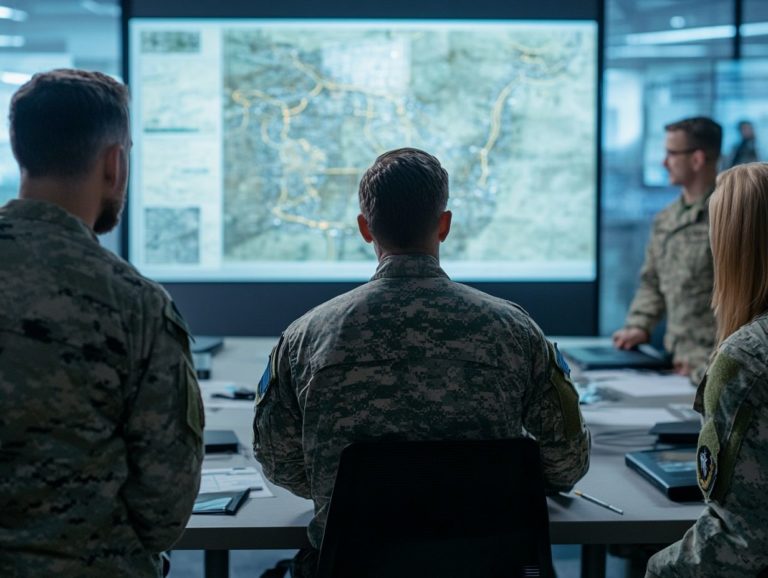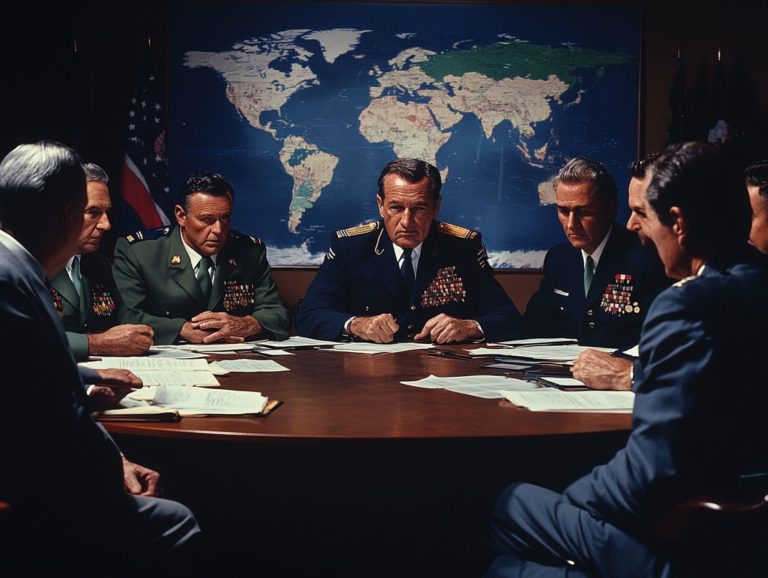The Importance of Time in Defense Strategies
In the high-stakes realm of defense, time transcends mere resource status it becomes a critical factor that can dictate success or failure.
This exploration delves into the pivotal role of time within defense strategies. It underscores how pressure and urgency shape decision-making processes. You will discover effective time management techniques and gain insights from real-life case studies that vividly illustrate the impact of time on defense tactics.
Flexibility emerges as a key theme, empowering teams to adapt to constantly evolving circumstances. Navigate with us through the intricate relationship between time and effective defense strategies, and elevate your understanding of this essential dynamic.
Contents
- Key Takeaways:
- Understanding the Role of Time in Defense Strategies
- The Impact of Time on Decision Making
- Strategies for Managing Time in Defense
- Case Studies: Examples of Time-Related Defense Strategies
- The Importance of Flexibility in Time Management
- Preguntas Frecuentes
- Q1: Cu l es el papel del tiempo en las estrategias de defensa?
- Q2: C mo se puede utilizar el tiempo en las estrategias de defensa?
- Q3: Por qu es importante considerar el tiempo en las estrategias de defensa?
- Q4: Cu les son las consecuencias de no gestionar el tiempo de manera eficaz en las estrategias de defensa?
- Q5: C mo ayuda la priorizaci n de tareas en las estrategias de defensa?
- Q6: Se pueden aprender habilidades de gesti n del tiempo para las estrategias de defensa?
Key Takeaways:
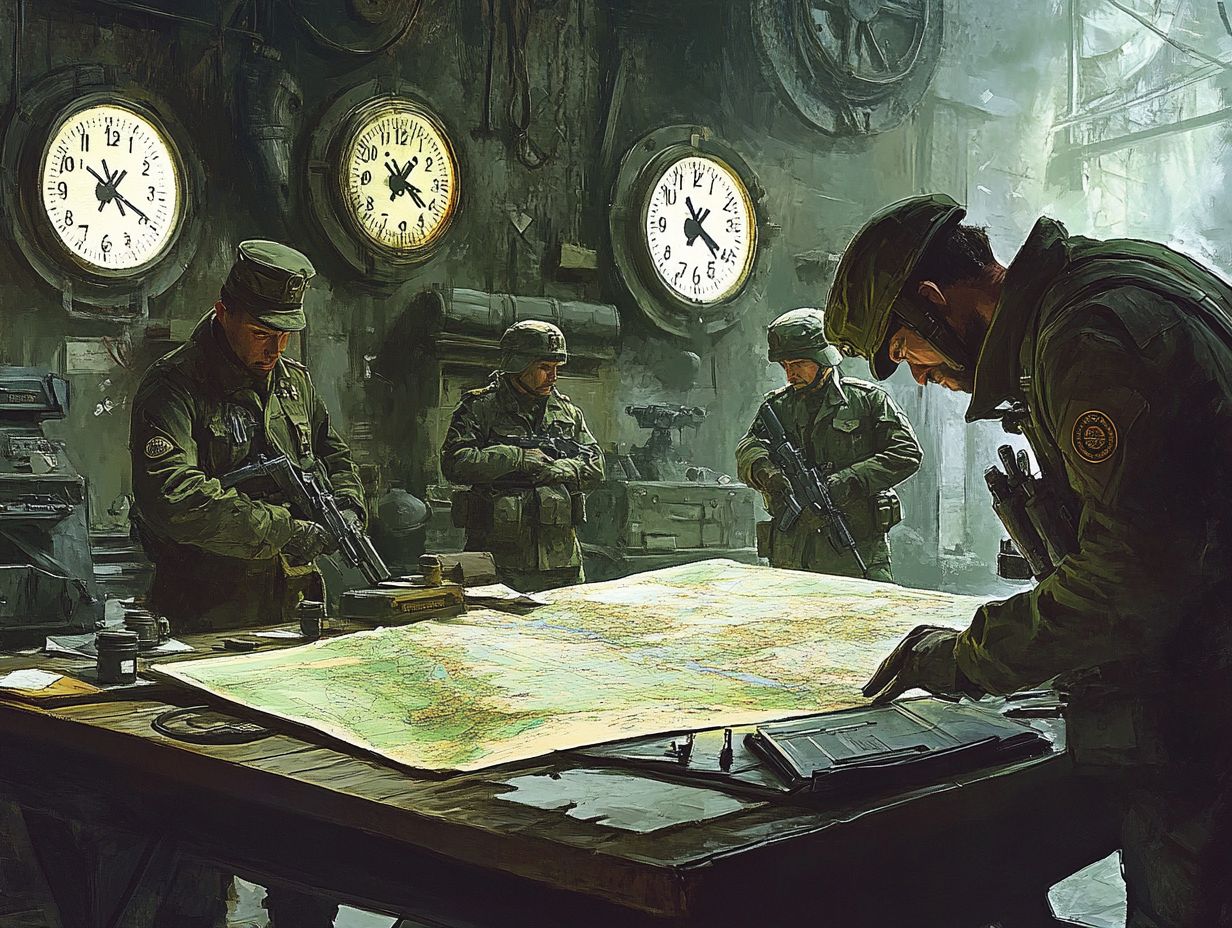
Time is a crucial factor in defense strategies as it can make or break the success of a mission.
Time pressure can significantly impact decision-making in defense tactics, leading to potentially detrimental outcomes.
Effective time management techniques and the ability to adapt to changing circumstances are essential for successful defense strategies.
Understanding the Role of Time in Defense Strategies
Understanding the critical role of time in defense strategies is essential, especially when addressing strategic threats like Chinese and Russian aggression, highlighting the importance of a multi-faceted defense.
In today s rapidly changing global landscape, the time-to-market for new capabilities becomes a competitive edge. This enables the Department of Defense to seize a first-mover advantage. This approach enhances your defense posture and emphasizes the importance of speed in operational systems.
As military challenges increasingly demand quick responses, the budgeting process must evolve. It must facilitate effective innovation within the Pentagon, significantly reducing the time between concept and execution.
Why Time Matters in Defense Tactics
Time is crucial in your defense tactics. The ability to act swiftly can make all the difference in military engagements, particularly against strategic threats like Chinese and Russian aggression.
In today s fast-paced military environment, you must prioritize speed and relevance. Ensure that your tactics are timely and impactful. For example, rapidly deploying advanced technologies can offer you a first-mover advantage, allowing you to establish dominance in critical areas before your adversaries can react.
Network effects can amplify these advantages. By integrating various military branches and sharing intelligence, you can facilitate quicker responses to unexpected challenges. This dynamic often shapes tactical decisions, such as the increased focus on cyber warfare capabilities to counter emerging threats.
By grasping the significance of time on operational success, you can navigate the complexities of modern warfare more effectively.
The Impact of Time on Decision Making
Time plays a crucial role in decision-making within the U.S. military. It intricately influences the budgeting process and ultimately shapes the effectiveness of military forces as they respond to strategic threats.
Your understanding of this dynamic can enhance your insight into military operations and priorities.
How Time Pressure Affects Decision Making
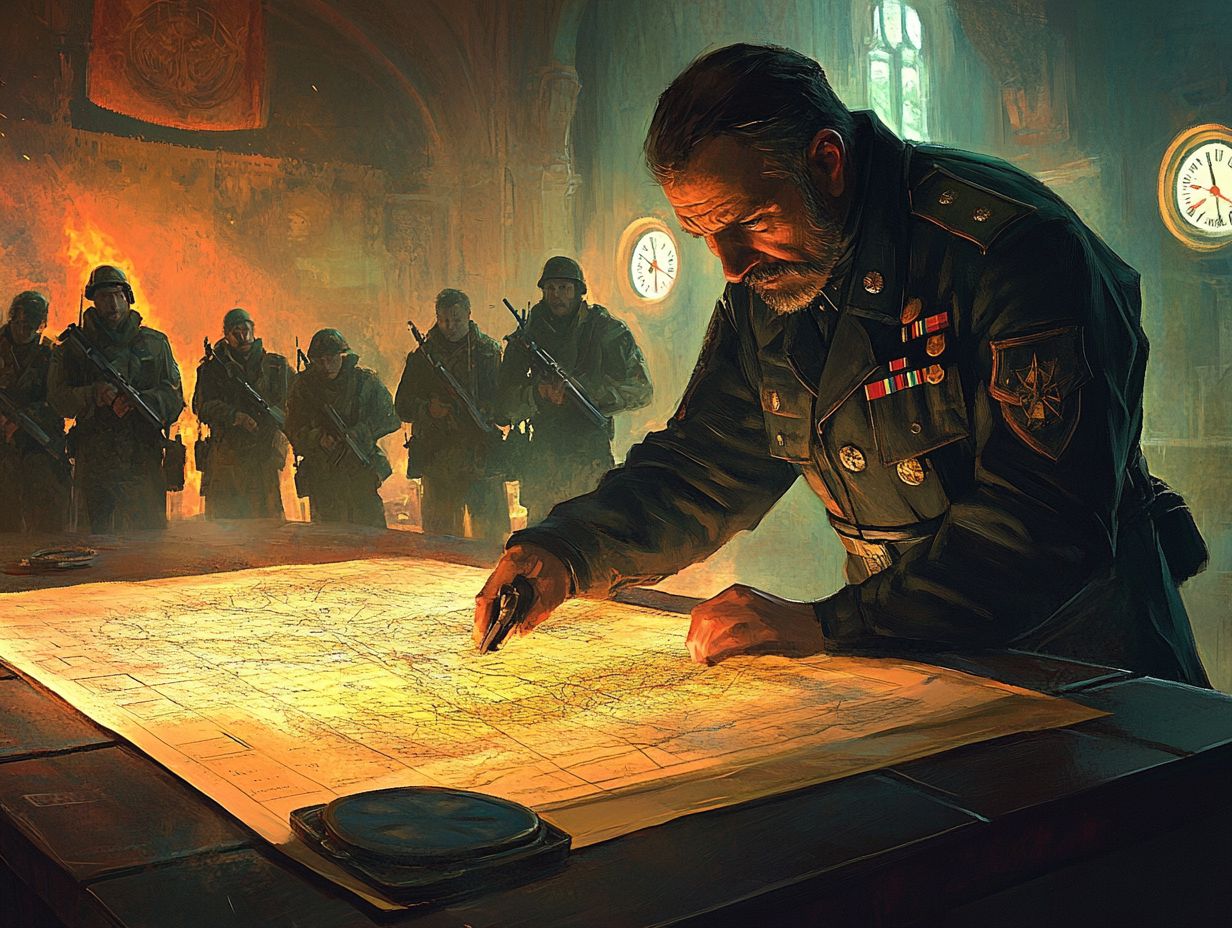
Time pressure can significantly impact decision-making in the U.S. military. It often leads to rapid reinforcement strategies that prioritize operational effectiveness over careful deliberation.
This heightened urgency acts as a double-edged sword. While it drives swift action in response to unforeseen threats, enhancing your overall tactical advantage, it can also lead to hasty decisions that overlook crucial intelligence or strategic nuances.
The fallout from these choices can ripple through the mission, affecting immediate outcomes and long-term objectives.
Thus, rigorous training and thorough preparedness become vital for you and your fellow military personnel. This foundation enables you to adapt quickly while maintaining a balance between speed and strategic thoughtfulness.
Strategies for Managing Time in Defense
Effective time management strategies in defense are crucial for ensuring that the U.S. military maintains its effective military capabilities. It must be poised to respond swiftly to emerging strategic threats.
Effective Time Management Techniques
Effective time management techniques in the defense department center on achieving a swift cycle time to tackle persistent military challenges efficiently.
By adopting methods like the Agile framework, you enable your teams to stay adaptable and responsive to ever-evolving threats.
Prioritizing tasks through more frequent scrums allows you and your stakeholders to quickly reassess strategies based on real-time intelligence.
Utilizing advanced project management software promotes clearer communication and streamlines decision-making processes.
These techniques not only boost the speed at which tasks are completed but also ensure that your personnel are better equipped to respond to urgent situations.
Ultimately, these approaches support timely interventions and create a culture of ongoing improvement.
Case Studies: Examples of Time-Related Defense Strategies
Case studies of time-related defense strategies offer invaluable insights into how the U.S. military has adeptly navigated strategic threats through innovative practices at the Pentagon.
These examples illustrate the effectiveness of forward-thinking approaches in addressing complex challenges and ensuring national security.
Real-Life Examples and Lessons Learned
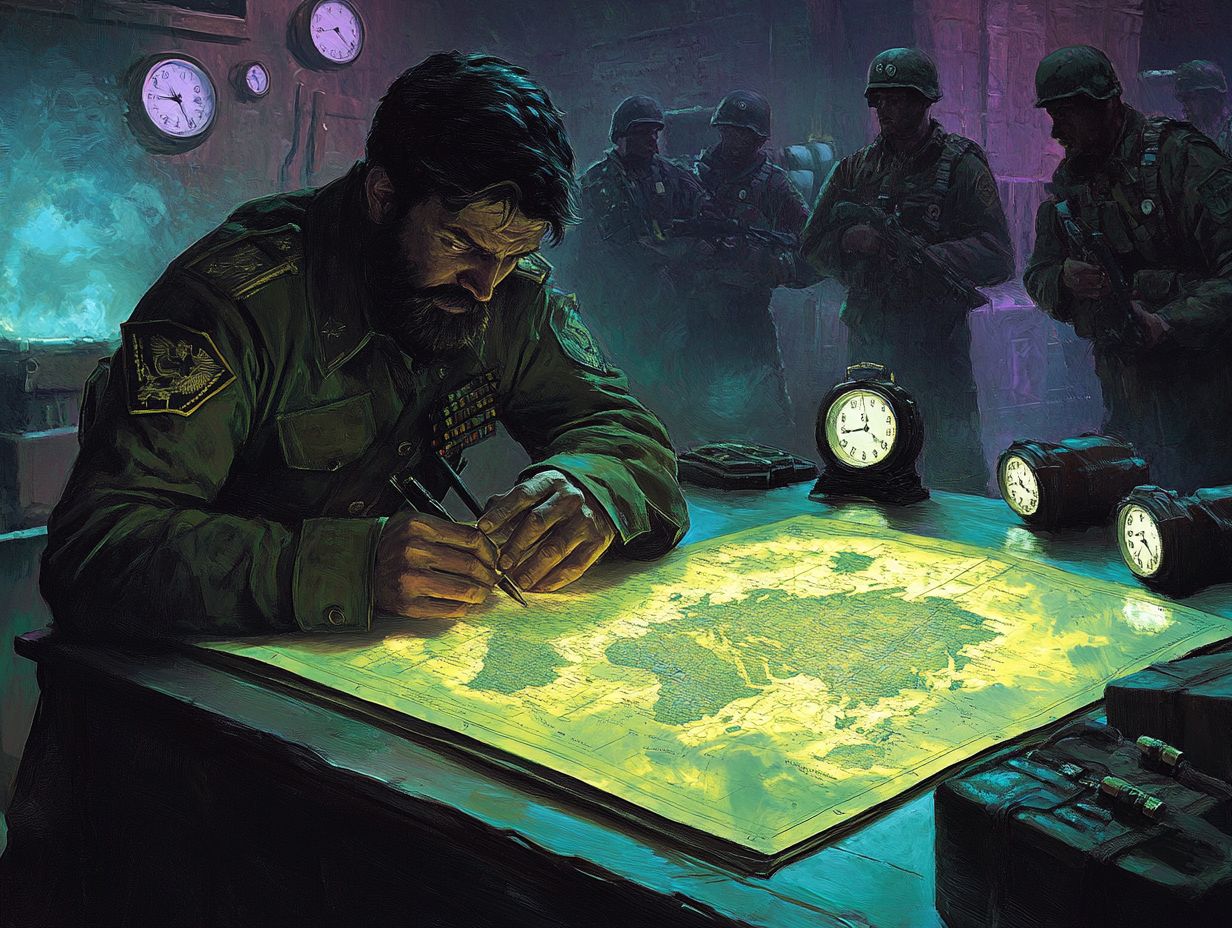
Real-life examples of time-related defense strategies illustrate invaluable lessons that shape your current practices for maintaining combat-credible forces and an effective defense posture.
Consider the rapid mobilization of NATO (North Atlantic Treaty Organization) forces during the Cold War; it vividly demonstrates how timely decision-making can deter potential aggressors.
Similarly, Operation Desert Storm highlighted the critical importance of achieving swift air superiority, resulting in a rapid and decisive victory.
These examples show why military strategies must evolve, incorporating flexibility and responsiveness that allow commanders like you to adapt to swiftly changing circumstances.
By diving into these historical contexts, you can harness the lessons of speed and adaptability, ensuring your readiness when confronted with unforeseen challenges.
The Importance of Flexibility in Time Management
Flexibility in time management is vital for your success in the U.S. military, as it gives you the power to adapt to the ever-evolving strategic threats and operational systems you face.
This means understanding global dynamics and localized threats, enabling you to respond swiftly in ways that can significantly influence the outcome of operations.
Adapting to Changing Circumstances
Adapting to changing circumstances is an essential skill that you should embrace, especially when implementing rapid reinforcement strategies to maintain a robust defense posture.
By fostering a culture of flexibility, you enhance your operational readiness and can pivot plans with minimal disruption.
Engaging in training exercises that mimic real-world scenarios is crucial for preparing yourself to think on your feet, while advanced technology supports real-time communication and decision-making.
Emphasizing collaboration among various branches ensures that your strategies are seamlessly integrated and leads to timely and effective responses to any emerging challenges.
Preguntas Frecuentes
Q1: Cu l es el papel del tiempo en las estrategias de defensa?

El tiempo desempe a un papel crucial en las estrategias de defensa, ya que es un recurso finito que debe ser gestionado eficazmente para lograr el xito.
El momento de las acciones y decisiones puede determinar el resultado de una estrategia de defensa.
Q2: C mo se puede utilizar el tiempo en las estrategias de defensa?
El tiempo se puede utilizar en las estrategias de defensa creando una l nea de tiempo, priorizando acciones y estableciendo plazos.
Tambi n puede usarse para evaluar y ajustar la estrategia seg n sea necesario.
Q3: Por qu es importante considerar el tiempo en las estrategias de defensa?
Considerar el tiempo en las estrategias de defensa es crucial. Permite un uso eficiente de los recursos y una mejor toma de decisiones.
Ayuda a anticipar y prevenir amenazas potenciales.
Q4: Cu les son las consecuencias de no gestionar el tiempo de manera eficaz en las estrategias de defensa?
No gestionar el tiempo puede llevar a oportunidades perdidas y retrasos en la respuesta. Esto puede resultar en recursos desperdiciados y una mayor vulnerabilidad.
Q5: C mo ayuda la priorizaci n de tareas en las estrategias de defensa?
Priorizar tareas asegura que las acciones m s importantes y urgentes sean atendidas primero. Esto maximiza el uso del tiempo y los recursos, aumentando las posibilidades de xito.
Q6: Se pueden aprender habilidades de gesti n del tiempo para las estrategias de defensa?
S ! Las habilidades de gesti n del tiempo se pueden aprender y mejorar. Se desarrollan mediante pr ctica y planificaci n adecuada.
Tambi n hay diversas t cnicas y herramientas para gestionar mejor el tiempo en estas estrategias.





